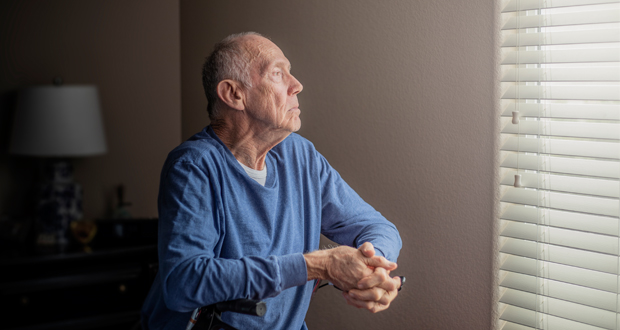Across the world, the greatest number of COVID-19 deaths are in older people, with many residents in aged care facilities at risk of the disease.
Complex health needs associated with multi-morbidity and frailty contribute to their risk. The hands-on provision of much of residents’ personalised care makes it impossible for residents and aged care workers to abide by social distancing recommendations. The home-like nature of aged care settings, where residents share common areas and facilities, including bathrooms, also contribute to the increased risk of transmission of COVID-19[1]. Given the high incidence of cognitive impairments such as dementia, supporting aged care residents to self-isolate to minimise risk, yet not cause social isolation and distress, is also immensely challenging.
Caring for dying residents is a core part of care in aged care facilities and the COVID-19 pandemic highlights why palliative care, including facilitating conversations about the person’s goals of care, and advance care planning, are more important than ever.
How or when a person should be transferred to an acute care facility for treatment if symptoms become severe is a further challenge, as this may not align with the older person’s expressed wishes or preferences for care. Pragmatic decisions about the extent of treatment in acute care may also be necessary when resources are limited.
Notwithstanding the importance of infection prevention and control, a broader focus and emphasis on the provision of palliative care as part of routine care in aged care facilities must not be forgotten.
A palliative approach to care, which is considered best practice for older people with life-limiting illnesses, including the growing number of people living with advanced dementia, can ensure symptom relief, optimise comfort and provide support to families[2]. As the number of COVID-19 deaths continues to climb, it is clear that all aged care workers need access to palliative care education and training.
Appropriately skilled staff are essential to provision of care during the crisis. Where possible, continuity of care should be prioritised as a strategy to minimise change for the older person. Similarly, adequate resources are needed so that registered nurses in aged care can manage symptoms to alleviate end-of-life discomfort and protect against residents dying in pain or from experiencing breathlessness.
Emotional support for residents is also good palliative care, as is the support of families in their grief, before and after death. When face-to-face family visits are not possible, the use of technology can be encouraged and facilitated to enable families to hold a ‘virtual vigil’.
Whilst not the same as being there in person, enabling family to ‘be with’ and talk to the dying older person is likely to provide significant comfort to all involved. Bereavement support, which is considered an essential element of palliative care, should still be provided in ways that abide by social distancing rules. Subsequent memorial services can be arranged later to enable families of COVID-19 victims to gather and commemorate the older person and their life, when it is safe to do so.
However, a palliative care approach is not feasible in all aged care settings without immediate consideration of the workforce implications. Aged care workers need extensive education to ensure they have the requisite skills, knowledge and resources to facilitate this level of care for older people approaching end of life.
In addition, psychological and teamwork supports must be established to equip aged care workers for their role in caring for the dying, challenging assumptions and attitudes towards death and the provision of end-of-life care.
Given that aged care is already a high mortality industry, the impact of COVID-19 may see workers overwhelmed with multiple deaths. Self-care is vital, accompanied by social and emotional support strategies for aged care workers.
Long-term preparation strategies that include embedding palliative care into educational curricula of all health care professionals has been a been a recommendation of the Australian and international palliative care community for many years.
The Australian Government has funded an ongoing project since 2003[3]. It has been suggested that the health care workforce would have been better equipped to deal with the suffering caused by this pandemic had this recommendation been heeded[4]. A similar focus is essential for the aged care workforce, the majority of whom are unregulated workers, with fewer opportunities for formal palliative care education, despite the high need in aged care facilities.
In response to the COVID-19 crisis, The Royal Commission into Aged Care Quality and Safety has acknowledged the urgency of identifying new and increased workforce and resource needs in aged care[5]. Included in these must be the support of the aged care workforce to provide much needed palliative care for older people in residential aged care facilities (RACFs) who are most at risk of dying.
Sara Karacsony, PhD, RN, is a lecturer in nursing in the School of Nursing at the University of Tasmania and Melissa Bloomer PhD, RN, is an associate professor of nursing in the School of Nursing and Midwifery at Deakin University.
- Davidson, P.M. and S.L. Szanton. Nursing homes and COVID-19: we can and should do better. Journal of Clinical Nursing [cited 2020 24 April]; Available from: https://onlinelibrary.wiley.com/doi/abs/10.1111/jocn.15297.
- Palliative Care Australia & Demenita Australia. Policy Statement. Palliative Care and Dementia. . 2018 [cited 2020 25 April]; Available from: https://palliativecare.org.au/download/490/.
- Department of Health, A.G. PCC4U Palliative Care Curriculum for Undergraduates. 2016 [cited 2015 January 12]; Available from: http://www.pcc4u.org/.
- Radbruch, L., et al. The key role of palliative care in response to the COVID-19 tsunami of suffering. The Lancet; Available from: https://www.thelancet.com/pdfs/journals/lancet/PIIS0140-6736(20)30964-8.pdf.
- Royal Commission into Aged Care Quality and Safety. Royal Commission Statement on COVID-19. 2020; Available from: https://agedcare.royalcommission.gov.au/news/Pages/media-releases/royal-Commission-statement-covid-19-27-march-2020.aspx.
Email [email protected]
 Aged Care Insite Australia's number one aged care news source
Aged Care Insite Australia's number one aged care news source

